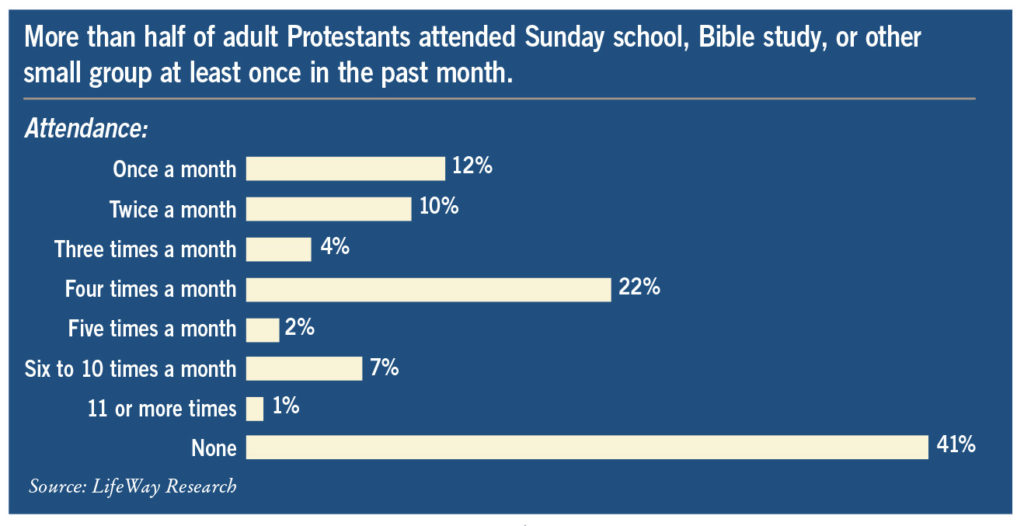by Matt Capps
The availability of the Bible for Christians in the West is a blessing.
Most of us have Bibles in various translations at our disposal, ensuring God’s transformative Word is always within arm’s reach. This affords us the ability to read the Bible any time we choose.
While this personal reading is essential for Christian formation, the practice of individual Bible study in the modern church may have eclipsed the historic practice of reading the Bible in community with other Christians.
Think about it: Before Johannes Gutenberg invented the printing press, few Christians had access to personal copies of the Scriptures. One could argue it wasn’t until the revolution of mass printing that personal quiet times were even possible for the majority of Christians.
Before that time, God’s Word was almost always studied in the context of community—primarily as part of a corporate gathering (Deuteronomy 31:12; Nehemiah 8:1; Luke 4:16-21; Acts 13:44). While most of us have the benefit and blessing of reading the Bible personally on a regular basis, we may be downplaying the transformative power of studying the Bible in Christian community.
For the most part, the modern world has exchanged information for intimacy. In our world, relationships are increasingly built through technology like phone calls, video chats, and social media, rather than face-to-face encounters. Yet, we were created for intimate community and fellowship (Genesis 2:18), which take place best when we are together with other people.
“It is easily forgotten that the fellowship of Christian brethren is a gift of grace,” Dietrich Bonhoeffer wrote in his book Life Together.
The church has a unique opportunity to hold up intimate community and face-to-face fellowship as a value that meets the deepest needs of humanity. Something absolutely beautiful, transforming, and miraculous happens as God’s children gather to study God’s Word.
The Apostle Paul proclaims in Colossians 3:16 we are to “teach and admonish one another.” It’s hard to do this when we’re not together with other members of the body of Christ (1 Corinthians 12). Christian sanctification is as much a group project as it is an individual pursuit. Community Bible study guards and guides our beliefs and feelings about God as we hold each other accountable and challenge one another with God’s Word.
In community study, we also benefit from the insight, wisdom, and perspective of others. We’re able to hear from those who are at different life stages, enabling us to see through the rich prism of the experience of others.
“When people are deeply affected by the Word, they tell other people,” Bonhoeffer wrote in Life Together. “God has willed that we should seek and find God’s living Word in the testimony of other Christians, in the mouths of human beings. Therefore, Christians need other Christians who speak God’s Word to them”
As we study in community, our understanding of God’s Word progresses as we grow together. And studying in a group may also improve our personal quiet time.
A recent study, published in the book Transformational Groups, found that 42 percent of Protestant churchgoers who are actively involved in a small group say they also regularly study and reflect on God’s Word on their own throughout the week. That drops to 10 percent for those who aren’t part of a small group.
The Bible is clear: none of us lives to himself (Romans 14:7). We are living stones being built up together (Ephesians 2:20, 22). We are to speak the truth in love to one another, as the body of Christ, being conformed to Christ together (Ephesians 4:15-16).
At the center of the biblical picture of spiritual growth is the study of God’s Word in the context of community. As J.I. Packer argues in his book Grounded in the Gospel, “The church is to be a learning-and-teaching fellowship in which the passing on of what we learn becomes a regular part of the service we render to one another.”
God designed us for community and fellowship. And God gave us His Word as the foundation for our community life. Like jagged rocks thrown into the rock tumbler of community, as we study God’s Word together, we will work out the rough edges of our life, and end up as beautiful, smooth stones reflecting the image of His Son.
MATT CAPPS (@MattCapps) is brand manager for The Gospel Project.









